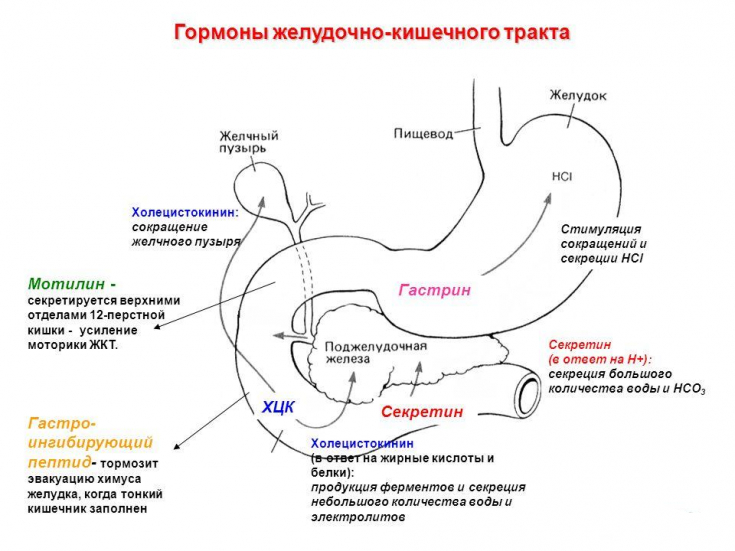Motilin is a very important hormone for the digestive system. It aids in the movement of food by causing contractions in the smooth muscles of the intestines. The very name "Motilin" describes its main function – activation of motility of the digestive organs.
Research related to this hormone is of particular interest to endocrinologists and gastroenterologists, as drugs that mimic the action of motilin can help treat digestive disorders in diabetes, in the treatment of diarrhea and irritable bowel syndrome.
For more about the function of motilin, its role in the human body, as well as research related to this hormone, read on estet-portal.com in this article.
How motilin affects intestinal motility
The level of motilin in the blood increases during fasting and immediately after eating, and decreases during meals. Motilin receptors are found in the digestive tract (stomach, large and small intestine). Their greatest concentration is found in the pylorus of the stomach.
Motilin regulates the migratory motor complex, which is involved in the muscular activity of the digestive system. This hormone is responsible for one of the most important phases of digestion – activation of muscle contractions, starting from the duodenum. This ensures the normal passage of food debris, mucus, and digestive juices.
The release of motilin is severely blocked during pregnancy, so pregnant women often suffer from constipation.
Motilin secretion is influenced mainly by mechanically induced pressure in the digestive system.
Ghrelin: lose weight by leaps and bounds
Additional digestive effects of motilin
Motilin enhances the action of acetylcholine, which stimulates peristalsis. This helps empty the small intestine of undigested food, preventing bacterial overgrowth and stimulating hunger. In addition, the activation of motility ensures that food debris does not block the absorption of nutrients in the small intestine.

Motilin also affects gastric secretion, stimulating the release of pepsinogen, and the pancreas by activating the synthesis of insulin and somatostatin.
This hormone works not only at the level of the digestive tract, it is also responsible for the proliferation of preadipocytes, and stimulates the differentiation of adipocytes.
Read the latest articles in Telegram!
Current Research: Motilin Receptor Activators and Blockers
Drugs that mimic the structure and action of motilin are of great interest to researchers. Drugs that increase the activity of motilin receptors, also called motilides, help reduce nausea and increase gastric emptying, these include: erythromycin, azithromycin, camycinal.
Drugs that block motilin receptors are also a growing area of research. Theoretically, they can help with digestive disorders that are caused by too active motor skills.
Motilin blockers are suitable for the treatment of diarrhea and irritable bowel syndrome.
Motilin research has focused on the development of activators or blockers of its receptors. There are very few clinical trials evaluating abnormally high or low levels of motilin.
In addition, the effects of motilin on other organs outside the digestive system are still not well understood.
Read also: Leptin: how to activate the satiety hormone







Add a comment